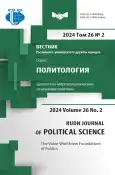The Value-Worldview Foundations of Politics: Conceptual Understanding and Prospects for Empirical Study. Introducing the Issue
- Authors: Selezneva A.V.1
-
Affiliations:
- Lomonosov Moscow State University
- Issue: Vol 26, No 2 (2024): The Value-Worldview Foundations of Politics
- Pages: 223-233
- Section: Editorial
- URL: https://journal-vniispk.ru/2313-1438/article/view/322426
- DOI: https://doi.org/10.22363/2313-1438-2024-26-2-223-233
- EDN: https://elibrary.ru/NRZCGW
- ID: 322426
Cite item
Full Text
Abstract
From the point of view of political science, the formation of a worldview is associated with a person’s awareness of himself in the surrounding socio-political reality, the development of a certain value attitude towards the objects present in it and the building of his own model of interaction with them. The semantic basis of a worldview is values, including political ones, which exist in the form of social ideals, shared by members of social groups or society, ideas about excellence in politics, or personal life orientations of an individual. Axiological guidelines for the development of a country are determined by national or traditional values. Having defined the content and semantic content of the concepts of «worldview», «ideology» and «identity», denoting interrelated socio-cultural and political-psychological phenomena based on values, the author offers a model of their conceptual coupling, reveals the semantic and instrumental aspects of the process of their formation. The formation of the value and worldview system of society is a long-term process, the nature and course of which is determined by the political and cultural traditions of the nation, the actual context of people’s life and the strategic objectives of the country’s development. The processes of formation of value and worldview systems of an individual and society are interconnected and interdependent.
About the authors
Antonina V. Selezneva
Lomonosov Moscow State University
Author for correspondence.
Email: ntonina@mail.ru
ORCID iD: 0000-0003-2500-6356
Doctor of Political Sciences, Associate Professor, Department of Political Sociology and Psychology, Faculty of Political Science
Moscow, Russian FederationReferences
- Artyukhin, O.A., Ivanova, L.L., & Batov, A.T. (2023). Ideological components of the «Pentabasis» model in modern policy of Russia. State and Municipal Management. Scholar Notes, 2, 190–196. (In Russian) https://doi.org/10.22394/2079-1690-2023-1-2-190-196
- Arutyunyan, M.P. (2008). The concept of worldview: A phenomenological approach. Social and Humanitarian Sciences in The Far East, 3(19), 9–22. (In Russian).
- Dobroshtan, V.M. (2018). Art and Worldview. St. Petersburg: SPbGUPTD. (In Russian).
- Kaminchenko, D.I. (2013). «New» media as an agent of certain political values distribution. Sociosphere, 4, 191–193. (In Russian).
- Kharichev, A.D, Shutov, A.Yu., Polosin, A.V., & Sokolova, E.N. (2022). Perception of basic values, factors and structures socio-historical development of Russia (based on research and testing materials). Journal of Political Studies, 3(6), 9–19. (In Russian) https://doi.org/10.12737/2587-6295-2022-6-3-9-19
- Kochetkov, A.P. (2015). The political elite as a subject of modernization of modern Russia. In A.I. Solovyov (Ed.), Ideas and values in politics. Political science: Yearbook 2015. (pp. 314–326). Moscow: Political Encyclopedia.
- Leontyev, D.A., & Mospan, A.N. (2017). Picture of the world, worldview, and definition of the indefinite. World of psychology, 2(90), 12–19. (In Russian).
- Leontyev, D.A. (2003). A worldview. Siberian Psychological Journal, 18, 152. (In Russian).
- Lvov, A.A. (2020). Modern concepts of the phenomenon of worldview. Bulletin of the Russian Christian Humanitarian Academy, 21(2), 11–23. (In Russian) https://doi.org/10.25991/VRHGA.2020.21.2.001
- Nikolaev, V.K., & Nikolaev, K.A. (2022). Ideology and worldview: An attempt of comparison. Humanitarian studies in Eastern Siberia and the Far East, 3, 108–120. (In Russian) https://doi.org/10.24866/1997-2857/2022-3/108-120
- Perevezentsev, S.V., Puchnina, O.E., Strakhov, A.B., & Shakirova, A.A. (2021). On the question of methodological principles of studying Russian basic traditional values. Moscow State University Bulletin. Series 18. Sociology and Political Science, 27(4), 113–133. (In Russian) https://doi.org/10.24290/1029-3736-2021-27-4-113-133
- Podshibyakina, T.A. (2023). Ideological aspects of the worldview: Research methodology in Political Science, Journal of Political Studies, 1(7), 38–49. (In Russian) https://doi.org/10.12737/2587-6295-2023-7-1-38-49
- Polosin, A.V. (2022). Step forward: The problem of worldview in modern Russia. Bulletin of Moscow University. Series 12. Political sciences, 3, 7–23. (In Russian).
- Selezneva, A.V. (2019). Conceptual and methodological foundations of the political-psychological analysis of political values. Bulletin of Tomsk State University. Philosophy. Sociology. Political science, 49, 177–192. (In Russian) https://doi.org/10.17223/1998863Х/49/18
- Sherbinin, A.I., Gomanovich, N.V., & Ershova, L.A. (2007). Mass media as a factor of the Russian political process at the beginning of the 21 century (the value aspect). Bulletin of Tomsk State University, 294, 129–131. (In Russian).
- Shmeleva, O.Yu., & Shablovm, V.A. (2023). Value and worldview foundations of the perception of the modern Russian state by young people in the context of global instability. Journal of Political Research, 7(1), 50–64. (In Russian) https://doi.org/10.12737/2587-6295-2023-7-1-50-64
- Solovyov, A.I. (2001). Political ideology: The logic of historical evolution. Polis. Political Studies, 2, 5–23. (In Russian).
- Titov, V.V. (2017). Politics of memory and the formation of national-state identity: Russian experience and new trends. Moscow: Typography «Your Format». (In Russian).
- Tsygankov, P.A. (Ed.) (2012). Universal values in world and foreign policy. Moscow: Moscow University Press, 2012. (In Russian).
- Volodenkov, S.V., Fedorchenko, S.N., & Pechenkin, N.M. (2023). Peculiarities of worldview formation in the contemporary digital environment: The analysis of academic discourses. Discourse-P, 20(1), 8–26. (In Russian) https://doi.org/10.17506/18179568_2023_20_1_8
Supplementary files









